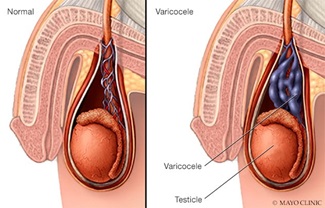Recent Posts
Enlarged veins can cause pain, infertility

Many people have heard of varicose veins before. But it's not just the leg veins that can become twisted, enlarged, and feel achy or itchy. Any vein can become varicose, including veins in the scrotum.
About 30% of men have enlarged and twisted veins in their scrotums. These are called varicoceles. They develop when blood pools in the veins instead of circulating out of the scrotum.

Varicoceles usually develop over time, beginning in puberty, but can occur at any age. It's more common to have a varicocele on the left side of the scrotum because of differences in the vein anatomy. In some patients, they can lead to impaired fertility.
Varicoceles symptoms
For many men, varicoceles cause no symptoms or discomfort. They may not even know they have the condition.
Some signs of varicoceles may include:
- Dull or aching testicle pain
It's more pronounced when you're standing and less when lying down. - A mass in the scrotum
It could look like a "bag of worms" if large enough, or only noticeable by touch. - Differently sized testicles
Occasionally, the testicle with varicocele can be smaller than the unaffected testicle. - Infertility
Challenges conceiving a child can occur due to varicocele's effect on sperm production.
Difficulties with infertility
Not all varicoceles cause infertility. It's estimated that 10% to 20% of men diagnosed with varicoceles have difficulties fathering a child. About 40% of men with fertility problems have a varicocele.
Varicoceles can affect fertility because they can affect the temperature of the testicle. Sperm production is most efficient at a lower temperature, about 4 degrees lower than the average body temperature. This is why the scrotum and testicles are outside the body cavity. Pooling blood in a varicocele can heat the testicles above the optimal temperature, leading to lower sperm counts. Similarly, men with fertility challenges are told to avoid hot tubs and saunas. The cooler testicle temperatures are more conducive to a high sperm count.
Microscopic surgery
Varicoceles that aren't causing pain, discomfort or other symptoms don't need to be treated. However, surgery may be necessary for men with significant testicular pain or low sperm counts affecting fertility; or young boys with delays in testicle growth.
Surgery aims to ligate the troublesome veins while preserving adequate blood flow through the arteries feeding the testicle. While the aim is to improve pain or fertility, the appearance of the varicocele may not change after surgery.
One type of surgery to treat varicoceles is called microsurgical subinguinal varicocelectomy. During this procedure, the surgeon uses an operative microscope and a doppler probe to assess blood flow through the testicle. The enlarged veins are closed off while the arteries are protected. The procedure usually takes two hours in an operating room.
A different procedure option is called embolization. A radiologist injects a coil or solution that scars and closes the troublesome veins, like leg varicose vein treatment.
Most varicoceles develop slowly over time. Talk with your health care team if you have concerns about testicular pain or fertility, or if you have a sudden onset varicocele, as it could be a sign of other health conditions.
David Yang, M.D., is a urologist in Mankato, Minnesota.





